It’s, what, 79 days before Christmas? Yes, in the Philippines, the countdown to Christmas Day started when September came around, and it is now normal to wake up to the early morning TV or radio show reminding you how many days there are left to the big day. Personally, I don’t really feel it yet and, given how short my attention span is, I think that’s a good thing. See, if I start celebrations early, I’ll run out of steam and the arrival of the actual day of Christmas would be… well, for lack of a better word, anticlimactic. So to each his own, I suppose. For now, I want to wrap up my visit to the Nagoya Castle by talking about visiting the Tower itself.
 After stepping out of the Hommaru Palace (I talked about it here) we made that short walk to the Nagoya Castle’s Main Tower. It’s quite an arresting site, really, and it didn’t matter that, on one side are visible the signs of reconstruction work on the Hommaru Palace.
After stepping out of the Hommaru Palace (I talked about it here) we made that short walk to the Nagoya Castle’s Main Tower. It’s quite an arresting site, really, and it didn’t matter that, on one side are visible the signs of reconstruction work on the Hommaru Palace.
As I mentioned in a previous post, most of the Nagoya Castle was destroyed in air strikes during the Second World War in 1945, and the Main Castle Tower and Hommaru Palace were not spared. The Hommaru Palace is being rebuilt to this day; the Main Castle Tower was rebuilt in 1959. This was because of the clamor of the people of Nagoya, who wanted the main symbol of Nagoya – the Castle Tower – to be restored to her former glory.

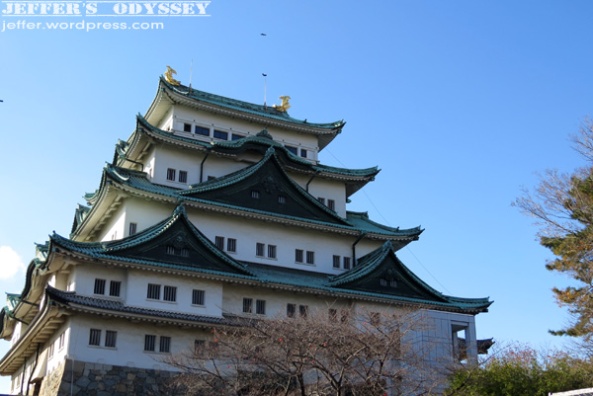 As you can see from one of the photos above, there were schoolkids visiting the Castle, presumably on a class trip.
As you can see from one of the photos above, there were schoolkids visiting the Castle, presumably on a class trip.
 Time to enter the Castle. I liked the feeling of walking through this type of entrance. Nothing too ornate about it, not like when you enter a normal museum (which this Castle Tower kind of is, really).
Time to enter the Castle. I liked the feeling of walking through this type of entrance. Nothing too ornate about it, not like when you enter a normal museum (which this Castle Tower kind of is, really).
 The Main Castle Tower has 7 floors, plus the basement, which is the first floor you’ll arrive at upon entrance.
The Main Castle Tower has 7 floors, plus the basement, which is the first floor you’ll arrive at upon entrance.
On the B (I really am guessing B stands for Basement) level, is where you will find a structural model of the Gold Water Well and a replica of the Kinshachi.
Below is the replica of the Kinshachi. Kin stands for “gold” and shachi refers to imaginary animals that are said to have the ability to “summon water”. Thus, they have come to be used as charms for fire prevention (somebody tell this to our Bureau of Fire Protection, quick!!). The two kinsachis (male and female) are at the top of the Nagoya Castle; the one below, on the basement, is just a replica.
They look like dolphins, really, and I think that has become the popular notion. So you’ll hear about the Nagoya dolphins every now and then to refer to these imaginary creatures.
The kinshachi atop the Castle are said to represent the power and wealth of the Tokugawa family and, according to popular belief, the statues are covered with gold that has a value equivalent to 1,940 large gold coins from the Keicho era. I don’t exactly know how much that’s worth, but… gold. 1,940. Wow. That’s gotta be a lot.
 This here is the structural model of the Ogonsui or Gold Water Well, specifically the wooden frame. It seems that gold water wells are common in castles, because there was also one at the Osaka Castle, the Kinmeisu Well. I think I talked about that in this post.
This here is the structural model of the Ogonsui or Gold Water Well, specifically the wooden frame. It seems that gold water wells are common in castles, because there was also one at the Osaka Castle, the Kinmeisu Well. I think I talked about that in this post.
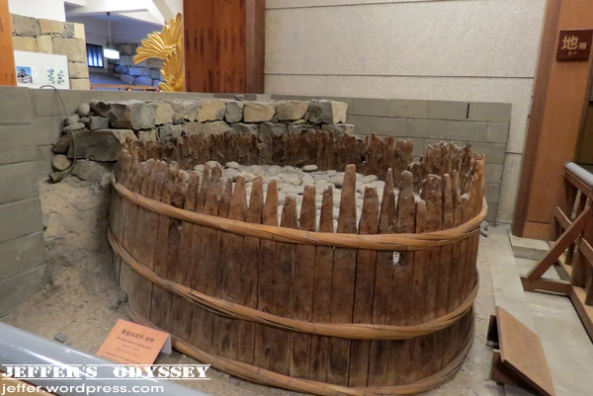
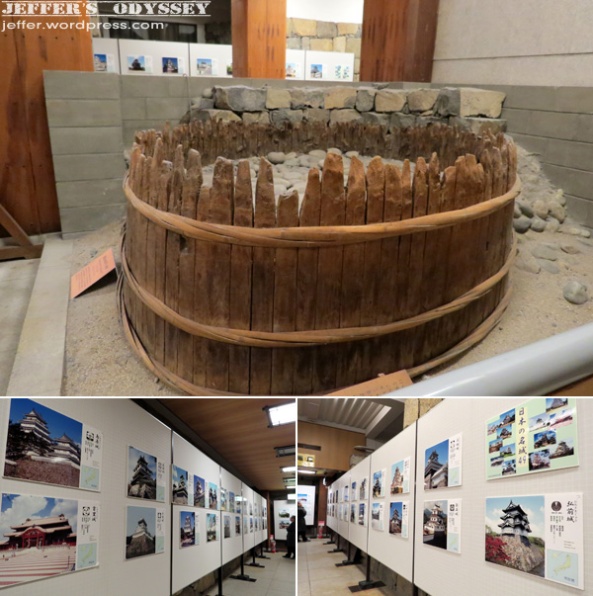 If you are up for some heavy reading, and you have lots of time, you can go over the artifacts and records, mostly pertaining to the history of the place. You can take the stairs or the elevator to go up the other levels. On the 1st level are scale models and screen paintings of Hommaru Palace. We skipped that because, well, we already came from Hommaru Palace, anyway.
If you are up for some heavy reading, and you have lots of time, you can go over the artifacts and records, mostly pertaining to the history of the place. You can take the stairs or the elevator to go up the other levels. On the 1st level are scale models and screen paintings of Hommaru Palace. We skipped that because, well, we already came from Hommaru Palace, anyway.
2nd floor was a no-go, because it is a Special Exhibition Hall that is open when… there is a special exhibition. We went directly to the 5th floor, where there is the full-scale replica of the Kinshachi. But there were a lot of people queuing to have their photo taken with the replica.
Besides, I was more drawn towards the “Stone Pulling Exhibit.” Guests can try pulling on the rope to pull on the stone.
This exhibit is a representation of how men during the time of the construction of the Castle went about with their jobs. Remember my mention of Kato Kiyomasa in a previous post, about him leading the men in the construction of the donjon? They had to haul stones that will be used to create this historic place, and it was well-depicted in this corner.
 You can never really get away from the kinsachi replicas, since the shops also sell keychains, badges, all in the shape of these dolphins.
You can never really get away from the kinsachi replicas, since the shops also sell keychains, badges, all in the shape of these dolphins.
 According to an inscription, the golden dolphins were formed “over a roughly carved block of wood (Japanese hinoki cypress), over which lead sheets were applied.” Copper was placed over the lead sheets, then applied with a final layer of gold. Now it’s not just plain gold, because it is gold obtained from pounding the Keicho-era gold coins I mentioned earlier.
According to an inscription, the golden dolphins were formed “over a roughly carved block of wood (Japanese hinoki cypress), over which lead sheets were applied.” Copper was placed over the lead sheets, then applied with a final layer of gold. Now it’s not just plain gold, because it is gold obtained from pounding the Keicho-era gold coins I mentioned earlier.
The kinshachis have an 18k gold plate quality. The female kinshachi has a weight of 18K gold equivalent to 43.39kg, while the male one weighs 44.69k.
Now here is a cut-away model of the original Nagoya Castle tower.
 The 6th floor was a No Entry zone, so we headed straight to the 7th floor, the Observation Deck.
The 6th floor was a No Entry zone, so we headed straight to the 7th floor, the Observation Deck.
 The Observation Deck is 34 meters above the ground, and gives you a view of the Castle grounds, as well as downtown Nagoya on all sides.
The Observation Deck is 34 meters above the ground, and gives you a view of the Castle grounds, as well as downtown Nagoya on all sides.


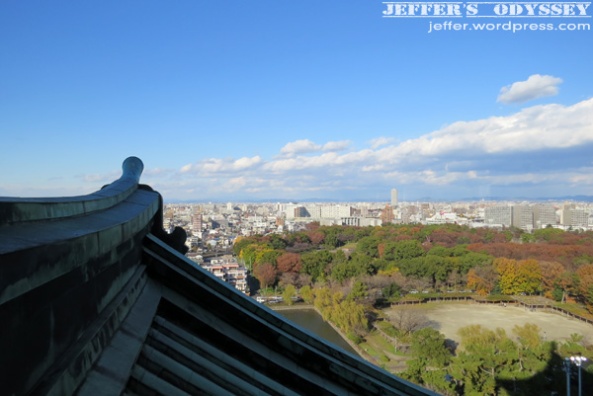 There were photos on the observation deck pointing out key buildings and mountains. But the fangirl in me was fixated on spotting the Nagoya Dome from here.
There were photos on the observation deck pointing out key buildings and mountains. But the fangirl in me was fixated on spotting the Nagoya Dome from here.
Can you see it below?
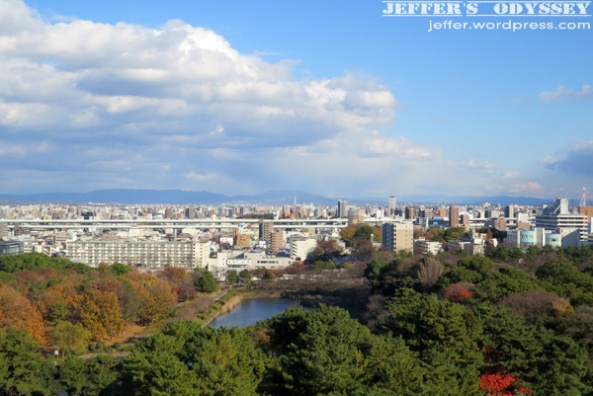 No? Then, shall we take a closer look?
No? Then, shall we take a closer look?
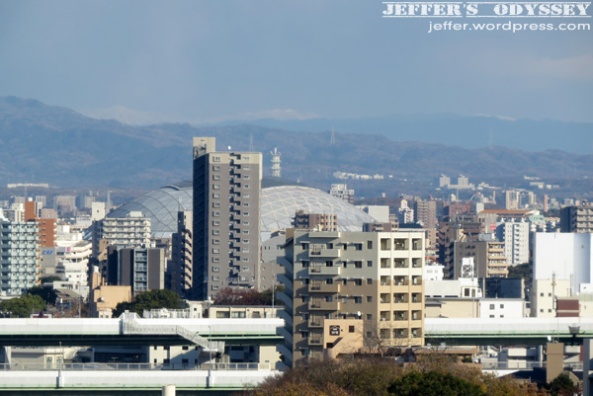
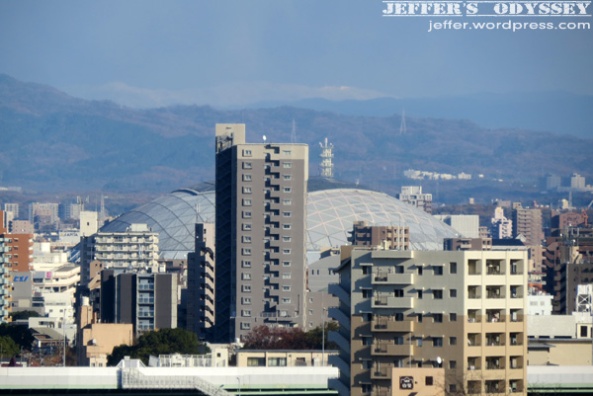 The main reason why we did not have a lot of time here was…. while we stepped out of Hommaru, I was staring at another Castle visitor who, like us, was holding a Digitalian bag…. and then I realized that we left our Arashi uchiwas at the hotel! And you cannot go to an Arashi concert without an Arashi uchiwa (especially this one, because it also doubles as the fanlight)! There is like an unwritten rule about that. So we had to fast-forward our Castle Tour, because we had to go back to the hotel to get them, haha!
The main reason why we did not have a lot of time here was…. while we stepped out of Hommaru, I was staring at another Castle visitor who, like us, was holding a Digitalian bag…. and then I realized that we left our Arashi uchiwas at the hotel! And you cannot go to an Arashi concert without an Arashi uchiwa (especially this one, because it also doubles as the fanlight)! There is like an unwritten rule about that. So we had to fast-forward our Castle Tour, because we had to go back to the hotel to get them, haha!
Anyway, it was still a satisfying circuit at the top of the Nagoya Castle, and we took the elevator down to head back to the hotel.
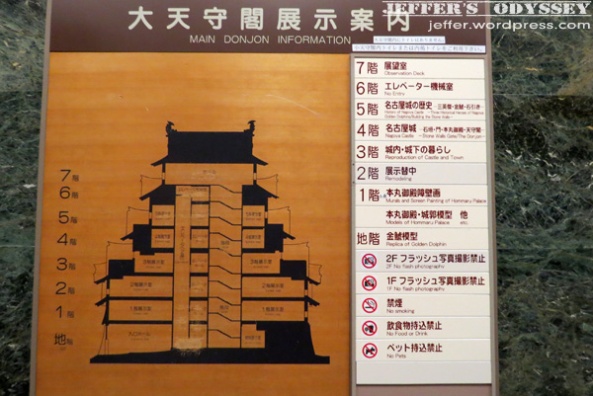
 Before I close this post, however, let me give you a closer look of the top of the Nagoya Castle, with the male and female kinshachis proudly displayed.
Before I close this post, however, let me give you a closer look of the top of the Nagoya Castle, with the male and female kinshachis proudly displayed.
 If you are making a brief stop in Nagoya and you want to check out at least one significant attraction, I suggest you go for Nagoya Castle. It’s definitely a good idea to revisit it once all the reconstruction work is done. Perhaps, someday…
If you are making a brief stop in Nagoya and you want to check out at least one significant attraction, I suggest you go for Nagoya Castle. It’s definitely a good idea to revisit it once all the reconstruction work is done. Perhaps, someday…


